MD4042 Leadership And Management Assignment Sample
Here’s the best sample of MD4042 Leadership And Management Assignment, written by the expert.
1. Introduction
The study focuses on the emotional and social intelligence aspects and identifies the relevance of leadership. The study sheds light on emotional intelligence and its origins in leadership for providing a better understanding of the relevance of leadership. The significance of emotional intelligence for leadership along with the emergence of primal leadership are explored in this study for providing appropriate insight into leadership and emotional intelligence. This study even explores and identifies the importance of self-awareness, self-management and social awareness and their roles in leadership and emotional intelligence.
2. Main Body
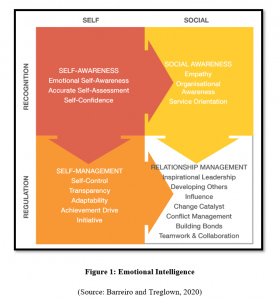
Emotional Intelligence refers to the ability to understand, manage and use emotions in a positive manner for relieving stress, empathize with others, effectively communicating and overcoming diffusion and challenges conflicts. As cited by Barreiro and Treglown (2020), emotional Intelligence assists individuals to create and build stronger relationships for achieving goals and objectives of life along with connecting with the feelings for turning intentions into action or making decisions. There are mainly four attributes of emotional intelligence which are self-management, self-awareness, social awareness and relational management. These attributes contribute towards emotional intelligence for assisting an individual to achieve their goals and objectives.
Emotional intelligence can be measured while utilizing and using multiple assessments which assist in measuring various levels of emotional intelligence. As narrated by Carragher and Gormley (2017), generally, two types of assessment assist in measuring the emotional intelligence of an individual such as self-report and ability tests. Self-report tests are considered as the most reliable assessment for measuring emotional intelligence in an individual as it is easier to administer along with a score. In this assessment, an individual has to answer the questions or statements to evaluate their emotional intelligence rating along with their behaviour.
Ability tests are the other type of assessment tool for measuring the emotional intelligence of an individual where the individual has to respond to the given situation for assessing their skills. As stated by Issah (2018), this type of assessment requires people who hold the capability to demonstrate their abilities and their rating is conducted by third parties. Moreover, the third parties conduct the assessment with the assistance of the Mayer-Salovey-Caruso Emotional Intelligence Test (MSCEIT) and Emotional and Social Competency Inventory (ESCI). These assessment tools help the third parties to conduct emotional intelligence assessment and in MSCEIT abilities are measured in four branches of Mayer and Salovey’s model of emotional intelligence.
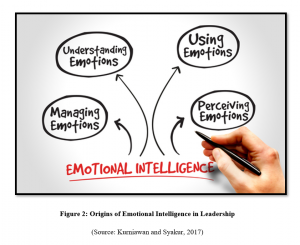
The origins of Emotional Intelligence in leadership which were derived by David McClelland identify certain requirements for effective leadership. The requirements for effective leadership mainly require the combination of self-awareness and empathy in them the obtaining effective results as a leader. As cited by Kurniawan and Syakur (2017), high emotional intelligence assists the leaders to enhance and increase their ability for identifying and recognizing the growing complexity of society along with various stakeholders for establishing effective communication channels. There are several benefits which an effective leader can acquire while consisting of high emotional intelligence such as internal awareness, self-regulation, increase empathy, corroborate communication and less stress.
Internal awareness: Making effective and efficient decisions requires an understanding of the feeling which can affect judgement, attitudes and productivity. An effective leader consists of certain skills and features such as self-awareness which assists the individual to identify the weakness and limitations of their team along with emotions (Chelladurai et al. 2018).
Self-regulator: Leaders who are incompetent and make impulsive decisions often fails to controls their emotions and leads to losing the respect of their team members of subordinates. These unregular moments can impact the reputation of the leader as well as create an image for questionable decision-making skills. As narrated by Lumpkin and Achen (2018), emotional intelligence often breeds self-regulation which builds and creates options for the leaders to make appropriate decisions while benefiting the organisation and their team members.
Increase empathy: Individuals consisting of high emotional intelligence hold good and effective understanding skills of their emotional states which assist them in enabling their gauge as accurately for the other employees. Therefore, effective leaders can enhance and increase their empathy for others and lead them more thoughtfully while making and taking deliberate decisions (Majeed et al. 2017).
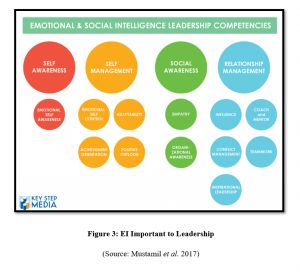
Emotional Intelligence is important to leadership as it is considered the key to successful leadership and turns a leader into an effective leader for the organisation. Multiple factors are contributed to emotional intelligence for an effective leadership style or approach. As stated by Mustamil et al. (2017), these factors such as emotional intelligence assists leaders to adapt, dramatically improves the teams and organisations, collaborative communication, improving organisational culture and high performance-driven results.
Emotional intelligence assists leaders to adapt: Leaders generally require and need the ability to adapt to the changing circumstances in the workplace while focusing on the roles along with the responsibilities of team members. Understanding and managing emotions are essential for leaderships for navigating leaders through an ever-changing world and for accomplishing an effective style or approach of an effective leader. Moreover, it helps leaders to master the relationships in a positive manner as relationships with the organisation and team members are crucial for effective leadership (Manzoor et al.2017).
Dramatically improves the team and organisation: Emotional intelligence helps leaders to improve their teams and organisation while inspiring and motivating the surroundings for enhancing work culture and productivity. As cited by Humphrey et al. (2018), leaders with high emotional intelligence focus on the collaboration between team members while creating synergy with a better experience for their team members and other employees.
Improving organisational culture: Leaders with emotional intelligence are often encouraged to build and create strong relationships while establishing open communication between the team members. Moreover, it assists the team to enhance their productivity and efficiency which eventually helps the organisation to achieve its goals and objectives (Dippenaar and Schaap, 2017).
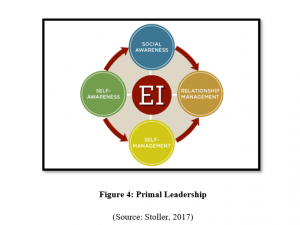
The emergence of primal leadership is surrounded by dimensions such as self-awareness, self-management, social awareness and relationship management. Primal leadership refers to the emotional dimension of leadership which helps leaders to articulate messages which resonate among the followers for emotional reality with a sense of purpose. As narrated by Stoller (2017), primal leadership consists of significance in the leadership as during the time of uncertainty it is considered as the most important aspect for the leaders. It is particularly important because it assists in establishing a relationship based on the neurology between attention, emotions and cognitions.
It is crucial for emotional intelligence as it is most competent to leaders who consist of a high degree of emotional intelligence.
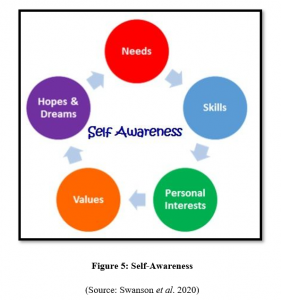
Self-awareness refers to the ability to identify the individual’s objectives while evaluating reflections and introspection. Self-awareness is an essential part of emotional intelligence is based on the idea of the entity observation of thoughts rather than thoughts as the individual has the capabilities to think, apart and separate their thoughts. Besides, when an individual engages in self-evaluation, the individual can provide certain thoughts for determining the thinking and feeling along with acting for identifying the standards and values. Various proven benefits can be derived and acquired from self-awareness for boasting the emotional intelligence of an individual (Swanson et al. 2020).
It helps individuals to be more proactive while boasting acceptance capabilities along with encouraging positive self-development. Moreover, it assists in enabling and allows people to consider things that are related to perspective for others, increases work productivity and creativity and generates self-esteem with the individual. As cited by Bowers et al. (2018), self-awareness plays a crucial role in leadership as it provides an understanding of personality which includes habits, traits and the ability for affecting interactions with people.
Self-awareness adds significance in leadership as it assists leaders to make better choices and it has the potential for affecting the organisation finances. Self-awareness helps leaders to acquire an understanding of their roles and allows them to be realistic in their expectations. Additionally, self-awareness enhances leadership skills while adding certain soft skills such as reflective, observant, empathetic, perceptive, responsive, humble, self-controlled, discerning and adaptable (Zhang et al. 2018).
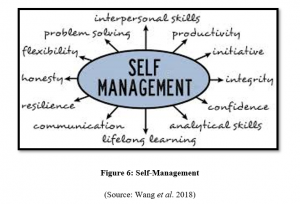
Self-management refers to the skills which allow people to control and regulate their emotions, behaviour and thoughts based on the situation or scenarios. Leaders with strong self-management skills can enable and allow themself to set independent goals while striving for accomplishing the goals. As stated by Wang et al. (2018), the leaders who hold the knowledge of self-management and its significance for controlling emotions and behaviour at the workplace are considered effective leadership. Self-management skills are essential for effective leaders as it enhances their skills while making them more organised at the workplace.
It boasts confidence along with increasing responsibility and accountability for the leaders who consist of self-management skills within themselves. Self-management assists leaders to prepare themselves for any sort of uncertainties or situations in the workplace and help to prioritise their goals for accomplishing the best outcomes. Self-management skills include multiple skills within it such as stress management, time management, organisational skills, self-motivation, accountability and adaptability. Self-management holds an essential role in leadership as it builds ethics, integrity and trustworthiness qualities for the organisation and for the team members which helps to retain the productivity levels for delivering effective outcomes (Treglown and Barreiro, 2020).
Moreover, it assists leaders to enable and build an atmosphere of helpfulness, respect and cooperation while helping others to commit to group efforts. As stated by Watson et al. (2019), consistent self-management skills help leaders to be an effective leader for delivering effective outcomes considering time management skills and empathy for the team members.
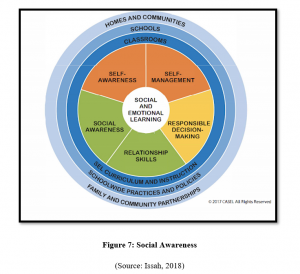
Social awareness refers to the ability to enable the perspective of and empathize with others while including diverse backgrounds and cultures. Mainly, it is the ability to determine and understand the ethical and social norms which are relevant to behaviours for recognising community support and resources. Social awareness often requires employees and leaders to acknowledge, support, value and respond towards cultural traditions, values, contributions, learning styles and communication. Social awareness requires competency in various areas which are relevant to emotional intelligence and empathy for interworking of multiple concepts (Issah, 2018).
Social sensitivity, social insight and social communication are interconnected while working equally and equate the theory of emotional intelligence along with social awareness. Social awareness is considered essential for leadership as it is the third pillar of emotional intelligence. As narrated by Ingram et al. (2019), social awareness assists leaders by enabling them to recognise and interpret the primary nonverbal cues for others which are created constantly while using communication skills.
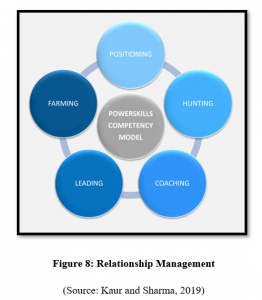
Relationship management is considered the fourth pillar of emotional intelligence and it refers to the manager’s work for improving business relationships with the partner clients and firms. Relationship management is categorised into two fields as client relationship management and business relationship management which share the common goals for facilitating and establishing healthy relationship management within an organisation. As stated by Kaur and Sharma (2019), effective relationship management is associated with communication, people skills and conflict management as important as the technical aspect of the organisation. Moreover, establishing effective relationship management requires strong communication skills along with coordination skills for facilitating optimal relationships with partners and clients.
Client relationship management refers to building a culture of relationships with the clients which are built based on values and trust rather than price. As narrated by Yang et al. (2020), client relationship management assists organisations to create barriers for their competitors and competitions and works with the senior executive, technical managers and sales managers. On the other hand, business relationship management identifies and overviews the entire internal communication of business units along with the cooperation of suppliers and other entities. There are certain requirements for establishing and implementing effective relationship management such as decision, interaction, outcome and needs. Relationship management is crucial for an effective leader for establishing trusting relationships with their team members, enabling mutual expectations, showcasing genuine appreciation, challenging unhelpful behaviours and building the future.
There are multiple leadership styles for effective leaders such as visionary, coaching, affiliative, democratic, pacesetting and commanding. The leadership style plays an essential role for the team member and the organisation whereas an autocratic leadership style refers to leaders who follow top-down approaches in their decision-making process and policies within a company. As stated by Nazri et al. (2017), an autocratic leader focuses less on collecting inputs from the team members and they are more intent to make their own decisions for others and ensures others follow and adamant it properly.
Transactional leadership refers to an individual who defines organisations, short term planning and controls, moreover they adopt the style which relies on the system of rewards and punishment for motivating their followers. Charismatic leadership style refers to leaders who utilise their communication skills, charm and persuasiveness for influencing others. Besides, this type of leader consists of the ability to connect with people to the deepest level and is considered valuable for organisations. Visionary or transformational leadership refers to an individual who creates a vision based on determining and identifying the requirements and needs of an organisation to guide their teams for achieving unified goals while motivating and inspiring (Beydler, 2017).
Transformational leadership styles often consist of the maximum emotional intelligence as they intend to motivate and inspire the teams and their followers. They hold soft skills such as self-awareness, self-regulation, motivation, empathy and social skills, which makes the transformational leadership style more specific and important to adopt in the organization more than other leadership styles.
3. Conclusion
The study concluded that effective leaders must consider and adopt emotional intelligence within them for being effective leaders for the organisation. The study sheds light on the significance of emotional intelligence for effective leadership along with its origins in leadership styles. Identification and exploration of multiple aspects in emotional intelligence in leadership and explored the multiple pillars of emotional intelligence as well as their importance in the leaderships for enhancing organisational culture and workplace environment. Relationship management and choice of leadership style are determined and considered in this study for providing reliable knowledge on the topic.
References
Barreiro, C.A. and Treglown, L., 2020. What makes an engaged employee? A facet-level approach to trait emotional intelligence as a predictor of employee engagement. Personality and Individual Differences, 159, p.109892. https://www.sciencedirect.com/science/article/pii/S0191886920300817
Beydler, K.W., 2017. The role of emotional intelligence in perioperative nursing and leadership: developing skills for improved performance. AORN journal, 106(4), pp.317-323. https://www.sciencedirect.com/science/article/pii/S0001209217307226
Carragher, J. and Gormley, K., 2017. Leadership and emotional intelligence in nursing and midwifery education and practice: a discussion paper. Journal of advanced nursing, 73(1), pp.85-96. https://onlinelibrary.wiley.com/doi/abs/10.1111/jan.13141
Ingram, A., Peake, W.O., Stewart, W. and Watson, W., 2019. Emotional intelligence and venture performance. Journal of Small Business Management, 57(3), pp.780-800. https://www.tandfonline.com/doi/abs/10.1111/jsbm.12333
Issah, M., 2018. Change Leadership: The role of emotional intelligence. Sage Open, 8(3), p.2158244018800910. https://journals.sagepub.com/doi/abs/10.1177/2158244018800910
Kaur, J. and Sharma, A., 2019. Emotional intelligence and work performance. International Journal of Recent Technology and Engineering, 8(2), pp.1658-1664. https://scholar.archive.org/work/gmy7eq4s5nhsvpnrwboe2pmm5a/access/wayback/https://www.ijrte.org/wp-content/uploads/papers/v8i2S3/B13010782S319.pdf
Kurniawan, A. and Syakur, A., 2017. The Correlation of Emotional Intelligence and Spiritual of Intelligence to Effectiveness Principals of Leadership. International Journal of Psychological and Brain Sciences, 2(1), pp.1-9. https://repository.stkippgri-sidoarjo.ac.id/id/eprint/339
Lee, Y.H. and Chelladurai, P., 2018. Emotional intelligence, emotional labor, coach burnout, job satisfaction, and turnover intention in sport leadership. European Sport Management Quarterly, 18(4), pp.393-412. https://www.tandfonline.com/doi/abs/10.1080/16184742.2017.1406971
Lumpkin, A. and Achen, R.M., 2018. Explicating the synergies of self‐determination theory, ethical leadership, servant leadership, and emotional intelligence. Journal of Leadership Studies, 12(1), pp.6-20. https://onlinelibrary.wiley.com/doi/abs/10.1002/jls.21554
Majeed, N., Ramayah, T., Mustamil, N.M., Nazri, M. and Jamshed, S., 2017. Transformational leadership and organizational citizenship behavior: Modeling emotional intelligence as mediator. Management & Marketing, 12(4), pp.571-590. http://eprints.um.edu.my/18999/
Maqbool, R., Sudong, Y., Manzoor, N. and Rashid, Y., 2017. The impact of emotional intelligence, project managers’ competencies, and transformational leadership on project success: An empirical perspective. Project Management Journal, 48(3), pp.58-75. https://journals.sagepub.com/doi/abs/10.1177/875697281704800304
Miao, C., Humphrey, R.H. and Qian, S., 2018. A cross-cultural meta-analysis of how leader emotional intelligence influences subordinate task performance and organizational citizenship behavior. Journal of World Business, 53(4), pp.463-474. https://www.sciencedirect.com/science/article/pii/S1090951617304066
Schaap, P. and Dippenaar, M., 2017. The impact of coaching on the emotional and social intelligence competencies of leaders. South African Journal of Economic and Management Sciences, 20(1), pp.1-16. https://journals.co.za/doi/abs/10.4102/sajems.v20i1.1460
Stoller, J.K., 2017. The clinician as leader: why, how, and when. Annals of the American thoracic society, 14(11), pp.1622-1626. https://www.atsjournals.org/doi/abs/10.1513/AnnalsATS.201706-494PS
Swanson, E., Kim, S., Lee, S.M., Yang, J.J. and Lee, Y.K., 2020. The effect of leader competencies on knowledge sharing and job performance: Social capital theory. Journal of Hospitality and Tourism Management, 42, pp.88-96. https://www.sciencedirect.com/science/article/pii/S1447677018304558
Wang, L., Tao, H., Bowers, B.J., Brown, R. and Zhang, Y., 2018. When nurse emotional intelligence matters: How transformational leadership influences intent to stay. Journal of nursing management, 26(4), pp.358-365. https://onlinelibrary.wiley.com/doi/abs/10.1111/jonm.12509
Zhang, L., Cao, T. and Wang, Y., 2018. The mediation role of leadership styles in integrated project collaboration: An emotional intelligence perspective. International Journal of Project Management, 36(2), pp.317-330. https://www.sciencedirect.com/science/article/pii/S0263786317300650
________________________________________________________________________________
Know more about UniqueSubmission’s other writing services:

